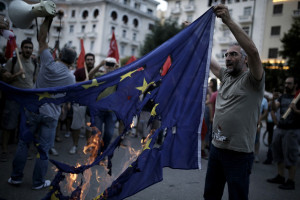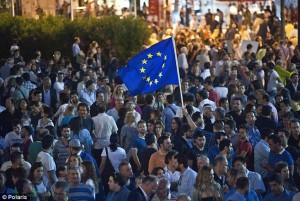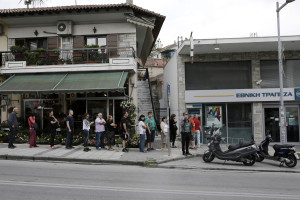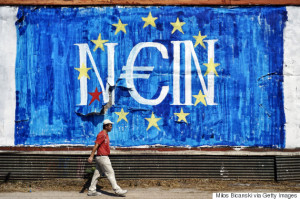Protesters burn an EU flag during an anti-austerity demonstration in Thessaloniki, Greece.
Practically since the moment of its victory in the January 25 elections, Greece’s Syriza party has been locked in a struggle with the “troika,” the triumvirate of the International Monetary Fund, the European Central Bank and the European Commission, over the terms of its bailout repayment. At every interim payment due date—the latest deadline is looming at press time—hysterical predictions ring out about the collapse of the Greek banking system and even the Greek economy, and the demise of the European Union due to a “Grexit,” or Greek exit from the Euro zone. Syriza swept to power on the strength of broad support for its promise to negotiate an end to the crushing austerity program, which has produced mass unemployment and widespread suffering in the country since the first rescue package was issued five years ago. But European financial and political leaders, with German capital and Prime Minister Angela Merkel’s government as their backbone, will not budge on their insistence on full repayment, no matter how much social pain it may cause.
A protester waves an EU flag at a pro-EU demonstration in Athens.
The Greek situation represents a crossroads for the European Union. Skepticism about the very idea of an alliance that is greater than the sum of its national parts continues to grow, as evidenced by the sharp rise in anti-EU parties across the bloc. This was just highlighted by the strong showing of the anti-immigration Danish People’s Party in the June Danish elections. The United Kingdom’s newly reelected Conservative government, pressed by the UK Independence Party—which garnered 13% of the May vote, the third-largest share—has promised to negotiate a still looser affiliation with the EU (Great Britain never joined the Euro currency zone) before holding a referendum on continued membership. Member states are dissenting on already agreed-upon common border and refugee policies, and populist leaders such as Hungary’s Viktor Orbán openly deride the European model of liberal democracy. Synergy at the level of elites and corporations accompanied by platitudes about peace, unity and well-being cover up broad insecurity about economic survival and identity at the base, especially (but not only) in the southern and newer eastern members. This fear and discontent has been exacerbated by the immigrant crisis, with hundreds of thousands of desperate Africans and Middle Easterners arriving by sea and by land, such as from Turkey through Serbia into Hungary, prompting the recent announcement of the construction of a border fence along the Hungary-Serbia border (also the current EU boundary).
In the eyes of Greece’s creditors, of the EU power elites, but even of the typical citizen of the better-off countries such as Germany—as revealed to me in conversations with otherwise solidly leftist friends—Greeks have been living entirely too well, with an overgrown and overpaid public sector and little payment of taxes, and must now pay the piper. It is true that tax evasion and corruption have been rampant in Greece, but the bulk of the spoils have filtered up to economic and political elites. And of course it is everyday Greeks who are being demanded to undergo increased deprivation so that, in the broken-record formulation of EU leaders, the country “respect its commitments” to pay back the over $400 billion in debt. Unemployment is officially over 25%, easily the highest in the EU; the average wage for those still employed has sunk from 2500 to 800 Euros (about $900) per month; and pensions have been cut 40%, with the troika demanding they be slashed further. It is unclear how the EU austerity plans can yield any kind of recovery—as Mark Weisbrot has pointed out, Greek’s debt burden has risen from 115% of Gross Domestic Product in 2010, when it got the first strings-attached IMF bailout, to over 170% now; and fully 89% of new loans flow right back into the coffers of the creditors, to pay interest (not even principal) on the debt.
A Grexit could arguably provide dramatic relief for Greece’s plight: with control of its own currency and freedom from Euro zone budget rules, the government could print money at will to pump into and stimulate the economy, and the consequent devaluation would make Greek exports cheaper and boost tourism, as tourists’ euros (or dollars, or roubles) would go farther. For these reasons, a sizeable fraction of Syriza favors this option, and a unilateral default. For the EU, however, it would set a destabilizing precedent, and throw fuel on the fire of resistance to the EU. But the troika, by rejecting Greek proposals to raise taxes on the wealthy rather than cutting pensions and public employment further, and maintaining the fiscal fundamentalist requirement of a 4.5% government budget surplus, has backed Syriza into a corner, from which there may be no other way out. For colorful Finance Minister Yanis Varoufakis, recently pulled back from his role as lead negotiator, and known for blunt statements such as his characterization of the austerity program as “fiscal waterboarding,” abolition of the surplus requirement is a “red line,” a core demand he will not compromise.
Underneath the parameters of budget and debt within which the day-to-day negotiation struggles are conducted lurk the ghosts of history. Greece, which suffered brutal occupation by Nazi Germany during World War II, bristles at being subject to economic veto power by the current German government. Thus when German Finance Minister Wolfgang Schäuble, EU point man in the negotiations, states that he pities Greece for electing an “irresponsible government,” it smacks of a new deprivation of self-determination. Thus Greece has floated demands for German reparations for the wartime ravages, which the Germans have decried as an irrational distraction and declared off the table. The U.K. and U.S. bear their own historical responsibility, having intervened to defeat the anti-Nazi resistance in the 1946-49 Greek Civil War; the continuing social divisions ultimately led to a military coup and dictatorship between 1967-74. Longtime cultural ties to Russia, which shares Greece’s Orthodox religious heritage, have encouraged rumblings that the Greek government would veto EU sanctions on the Russians for their actions in Ukraine; and Russian President Vladimir Putin has hastened to poke the EU in the eye by indicating an interest in stepping in with financial, and political, support.
Customers queue to use an ATM outside a National Bank of Greece bank branch.
Even President Obama has expressed his dissatisfaction with the troika’s hardline position, stating that “you cannot keep on squeezing countries that are in the midst of depression . . there has to be a growth strategy in order for them to pay off their debts.” Some commentators have envisioned the US leader stepping in to force an agreement, to forestall the possibility of the West’s losing a strategic bridge to the Middle East, though this probably exaggerates the U.S. President’s power, as well as his willingness to cross the banks. And EU negotiators might respond by pointing out Goldman Sachs’s role in using derivatives to cook Greece’s government books, to smooth its entry into the Euro zone in the early 2000s.
Anti-EU graffiti on June 30, 2015 in Athens.
The US media, in relentlessly describing Syriza as a “far-left party,” has bolstered the view that anyone who questions the dogma of austerity and debtors’ fealty is being “irresponsible.” While it is true that the party’s name translates into “Coalition of the Radical Left,” as the Health Minister stated following their election, “today, Syriza is not a left-wing party . . [but] a patriotic party which . . demands the right to live in dignity.” Its dependence on the right-wing anti-austerity Independent Greeks to maintain power precludes any radical transformation. But the hardline position of the EU powers risks pushing Syriza, along with the Spanish Podemos party, Italy’s Five Star Movement and other growing middle-class movements resisting austerity, to more radical disruption. And if the essentially pro-European leaders of such parties become coopted, it risks their membership looking for solutions on the far right, in Greece’s case the neo-Nazi Golden Dawn, which moved up to third in the January elections.




